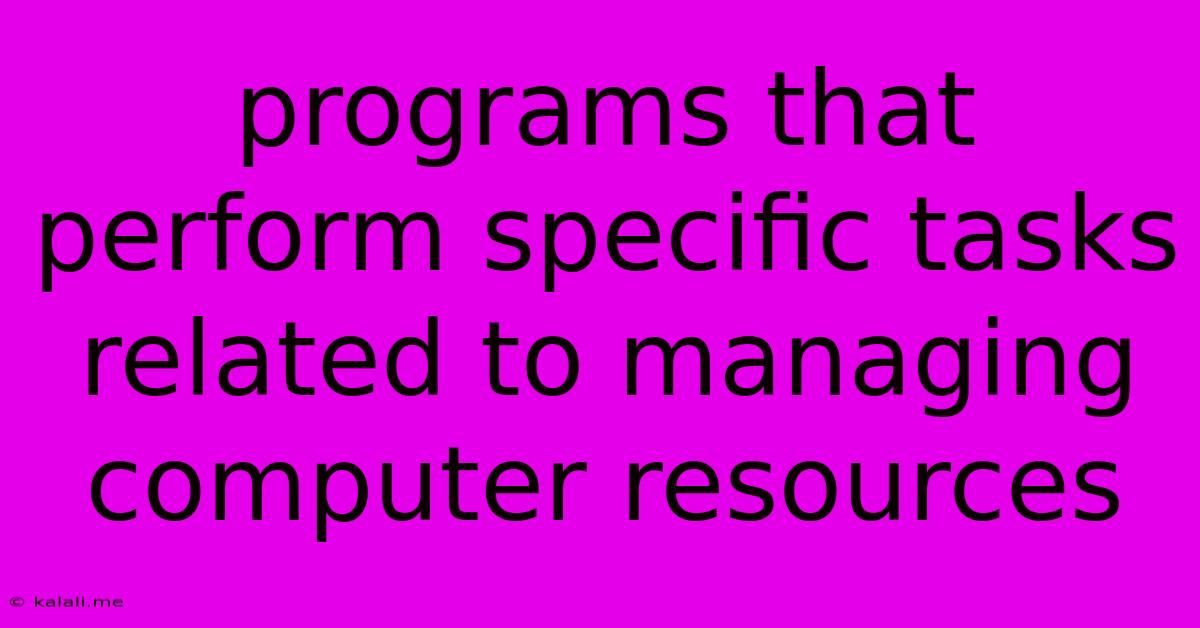Programs That Perform Specific Tasks Related To Managing Computer Resources
Kalali
Jun 15, 2025 · 3 min read

Table of Contents
Programs That Perform Specific Tasks Related to Managing Computer Resources
Managing your computer's resources effectively is crucial for optimal performance and stability. This article explores various software programs designed to handle specific tasks related to memory management, process control, disk optimization, and more. Understanding these tools empowers you to troubleshoot issues, improve system speed, and maximize the lifespan of your hardware.
What are Computer Resources?
Before diving into specific programs, let's define what we mean by "computer resources." These include:
- Central Processing Unit (CPU): The "brain" of your computer, responsible for executing instructions.
- Random Access Memory (RAM): Short-term memory that stores data currently being used by programs.
- Hard Disk Drive (HDD) / Solid State Drive (SSD): Long-term storage for your operating system, applications, and files.
- Network Connection: Access to the internet and other devices on a network.
- Graphics Processing Unit (GPU): Handles graphical processing, essential for gaming and video editing.
Software for Managing Computer Resources:
Many programs directly or indirectly manage these resources. Here are some key categories and examples:
1. Task Managers & Process Monitors:
These programs provide real-time insights into your computer's processes, allowing you to identify resource-intensive applications and manage them accordingly. Features typically include:
- Process listing: Viewing currently running programs and their CPU/memory usage.
- Process termination: Forcefully closing unresponsive or problematic applications.
- Resource monitoring: Graphs and charts illustrating CPU, RAM, and disk usage over time.
- Startup management: Controlling which programs launch automatically on startup.
Examples: Task Manager (built into Windows), Activity Monitor (macOS), System Monitor (Linux). Third-party options often offer more advanced features like detailed performance analysis and process prioritization.
2. Disk Cleanup & Optimization Utilities:
These tools help maintain the health and efficiency of your hard drive or SSD. Key functions include:
- Disk cleanup: Removing temporary files, system logs, and other unnecessary data to free up space.
- Disk defragmentation (HDDs): Rearranging files on the hard drive to improve access times (less relevant for SSDs).
- Disk analysis: Identifying large files and folders to help you manage storage space effectively.
- Error checking: Scanning for and repairing bad sectors on the hard drive.
Examples: Disk Cleanup (Windows), Disk Utility (macOS), various third-party tools offering more advanced features like drive cloning and data recovery.
3. Memory Management Tools:
While the operating system handles most memory management automatically, dedicated tools can offer more control and insights. These might include:
- RAM monitoring: Tracking RAM usage in real-time to identify memory leaks or resource-intensive processes.
- Virtual memory management: Configuring the size of the paging file (swap space) to optimize performance. (This is often handled automatically by the OS but can be customized).
- Memory diagnostic tools: Scanning for RAM errors and identifying faulty modules.
Examples: Many system monitoring tools (mentioned above) include RAM monitoring. Dedicated memory diagnostic tools are available for more thorough testing.
4. System Monitoring & Performance Analysis Tools:
These provide a comprehensive overview of your computer's performance, allowing you to identify bottlenecks and areas for improvement. They often combine features from the categories above, along with:
- Overall system performance monitoring: Tracking CPU, RAM, disk I/O, and network usage simultaneously.
- Performance benchmarking: Comparing your system's performance to others.
- Detailed logging and reporting: Generating reports on system performance over time.
Examples: Many free and paid options are available, each with varying levels of detail and features. Look for tools that support your operating system and meet your specific needs.
5. Resource Schedulers (Advanced Users):
For advanced users, resource schedulers allow for fine-grained control over how your computer allocates resources to different processes. This is generally not necessary for average users but can be crucial for server administration or high-performance computing environments.
By understanding the different types of programs available and their functions, you can effectively manage your computer's resources, leading to improved performance, stability, and overall system health. Remember to always choose reputable software from trusted sources to avoid malware and maintain the security of your system.
Latest Posts
Latest Posts
-
1 Lb Macaroni Is How Many Cups
Jul 30, 2025
-
How To Hand Sew Two Pieces Of Fabric Together
Jul 30, 2025
-
What Is 1 4 Cup 1 4 Cup
Jul 30, 2025
-
How Many Candy Corn In A Bag
Jul 30, 2025
-
What Percentage Of An Hour Is 15 Minutes
Jul 30, 2025
Related Post
Thank you for visiting our website which covers about Programs That Perform Specific Tasks Related To Managing Computer Resources . We hope the information provided has been useful to you. Feel free to contact us if you have any questions or need further assistance. See you next time and don't miss to bookmark.